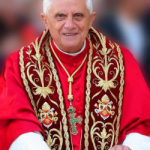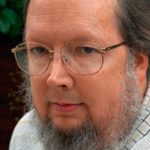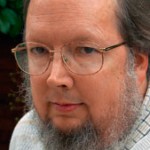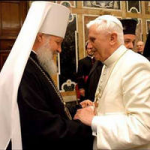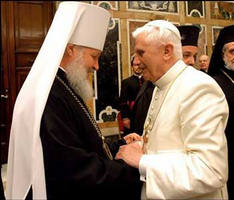Deprecated: trim(): Passing null to parameter #1 ($string) of type string is deprecated in
/home/aoiusa/public_html/wp-content/plugins/sexybookmarks/public.php on line
388
Deprecated: trim(): Passing null to parameter #1 ($string) of type string is deprecated in
/home/aoiusa/public_html/wp-content/plugins/sexybookmarks/public.php on line
394
Deprecated: trim(): Passing null to parameter #1 ($string) of type string is deprecated in
/home/aoiusa/public_html/wp-content/plugins/sexybookmarks/public.php on line
400
 We are getting more news from the Catholic/Italian press than we are from Orthodox sources. This report appears reliable; the author has a good grasp of the ecclessiological disagreements between Constantinople and Moscow, particularly the conflict about what constitutes primacy in Orthodoxy. This question must be settled before a Pan-Orthodox Council can take place and before dialogue with Rome can proceed with any seriousness.
We are getting more news from the Catholic/Italian press than we are from Orthodox sources. This report appears reliable; the author has a good grasp of the ecclessiological disagreements between Constantinople and Moscow, particularly the conflict about what constitutes primacy in Orthodoxy. This question must be settled before a Pan-Orthodox Council can take place and before dialogue with Rome can proceed with any seriousness.
Both Constantinople and Moscow have different interests at stake. Moscow sees a working alliance with Rome (not unity) as a practical necessity to re-Christianize Europe in order to roll back the hedonism, moral relativism, lowered value of human life and other afflictions associated with secularism. Constantinople has expressed little interest in Moscow’s (and Rome’s) agenda and prefers instead to focus on global warming and other boutique issues.
Highlights from the article:
In Ravenna, the delegation of the Patriarchate of Moscow decided to withdraw, as a sign of protest against the participation in the event, of members of the so-called Estonian Apostolic Church, founded by the Patriarch of Constantinople in 1996 in Estonia and declared “autonomous” by him, a statute which is not recognised by the Russian Church. Hilarion faced a challenge that was common in a “de-Christianised world”, dominated by consumerism, hedonism, practical materialism and moral relativism.” Thus, only together can we put forward the spiritual and moral values of the Christian faith to the world.” But the greatest difficulties between Rome and Moscow are created indirectly by the division that exists within the Orthodox Church.
And indeed, the ecumenical Patriarchate of Constantinople has convened a Synaxis (the Greek word for a religious assembly) to which he has invited the ancient Orthodox Churches, that is, the Orthodox Patriarchs of Jerusalem, Antiochia and Alexandria, as well as the Archbishop of Cyprus. Two questions were addressed during the meeting held in Istanbul on 1 and 2 September: the situation of Christians in the Middle East and the current state of inter-Orthodox relations ahead of the Pan-Orthodox Council.
The aim was to put an end to the deadlock this Council’s Preparatory Commission is experiencing. This objective was announced over a year ago, in June 2010, during Patriarch Bartholomew I’s historic visit to Russia. The Patriarch’s decision to invite the Archbishop of Cyprus lies in the fact that the Cypriot Church “just like the three Patriarchates, owes its autocephaly to the decision taken in an ecumenical council.” In the letter which convened the Synaxis, Bartholomew I indicated that this singularity “did not intend to exclude the other Orthodox Churches form pan-Orthodox decisions, on the contrary, it is aimed at supporting and favouring unity.”
The idea of convening a synaxis was, indeed, met by strong criticism from the Patriarchate of Moscow, according to what was said on 21 June by metropolitan Hilarion, President of the Department for External Church Relations. At the time, the metropolitan said “he did not agree that one particular group of Churches should consider itself “the pillar” of world Orthodoxy based on the fact that autocephaly is older than the other Churches,” pointing out that “an attempt is being made to divide Orthodoxy into “first and second rate” Churches. If we wish to prepare properly and to carry forward the Pan-Orthodox Council, we must support the ecclesiological concepts that unite all Orthodox Churches and not create new concepts which only bring division and chaos,” he affirmed.
Full article follows.
Source: La Stampa (Vatican Insider) | October 3, 2011
The Orthodox Church has become convinced that together with the primacy, synodality buttresses the government and the Church’s organisation
Giacomo Galeazzi, vatican city
After metropolitan Hilarion’s visit to Castel Gandolfo had brought the meeting between Benedict XVI and Moscow’s Patriarch, Kyril, closer, the primacy dispute between the Eastern Orthodox Churches, has re-emerged as an obstacle. Internal divisions between Orthodoxy seem capable of slowing the Pope’s path towards his historic face to face meeting with the Russian Patriarch, which would probably take place on “neutral ground”, Bari for example.
One of the main sore points, are the principles for the declaration of the Orthodox Churches’ autonomy (an autocephalous proclamation). This has caused the most friction between the, especially between the Greek and Russian Orthodox Churches. The latter holds the majority in Orthodoxy, as it has been autocephalous since 1488. Still, now, more than ever, significant steps are being taken towards advancing dialogue between the Holy See and the Orthodox faith, on the relationship between primacy and synodality in the Church and on the importance of spiritual ecumenism, in view of a complete and clear unity between all Christians. Even Vatican Radio wrote that Hilarion’s arrival in Castel Gandolfo opened the way for new hope.
Between Rome and Moscow, the situation already seems clear, particularly the question of the “prótos-kephalé” ministry – the “supreme head” of the Church – on a local level (the Bishop), on a regional level (the Patriarch) and on a universal level (the Bishop of Rome), applying Canon 34 of the Apostles (a fundamental text for Eastern ecclesiology) to all three levels, in a similar way. In this sense, under Benedict XVI’s pontificate, a fundamental agreement was reached between Catholics and the Orthodox Church made on a common theological, ecclesiological platform, on which the two denominations based the discussion regarding the primacy of the Bishop of Rome.
The Orthodox Church reached the conclusion that, just like primacy, synodality constitutes the government and the Church organisation’s supporting framework. An encouraging move towards mutual understanding and the identification of common elements between them. The only problems that remain are essentially related to hermeneutics, that is, the interpretation of the word of God, as it is testified in the Holy Scriptures and in the living tradition of the Church. There are also urgent questions related to anthropology and ecclesiology.
Archbishop Hilarion of Volokolamsk, President of the Department for External Church Relations of the Patriarchate of Moscow acknowledged Benedict XVI in light of the new situation between the Catholic Church and the Patriarchate of Moscow: “We have overcome all the tensions that have existed over the years and our relations are now normal, peaceful and even positive and constructive.” Hilarion expressed the high esteem he felt towards Benedict XVI, who is thought very highly of within the Russian Orthodox Church. The Archbishop reflected on the role of the Bishop of Rome in the Church’s communion during the first millennium, when the Great Schism of 1054 had not yet taken place.
The focus is on how the content of the primacy of St. Peter’s successor, evolved during the second millennium, after the split between the two confessions, particularly after the First and Second Vatican Council. The subject had already been discussed in depth on occasion of the tenth Plenary Assembly of the mixed Commission which met in the Italian city of Ravenna, between 8 and 14 October 2007. Thirty Catholic delegates and 30 Orthodox representatives gathered to reflect on the topic: “The ecclesiological and canonical consequences of the sacramental nature the Church: ecclesiastic communion, conciliarity and authority in the Church.”
In Ravenna, the delegation of the Patriarchate of Moscow decided to withdraw, as a sign of protest against the participation in the event, of members of the so-called Estonian Apostolic Church, founded by the Patriarch of Constantinople in 1996 in Estonia and declared “autonomous” by him, a statute which is not recognised by the Russian Church. Hilarion faced a challenge that was common in a “de-Christianised world”, dominated by consumerism, hedonism, practical materialism and moral relativism.” Thus, only together can we put forward the spiritual and moral values of the Christian faith to the world.” But the greatest difficulties between Rome and Moscow are created indirectly by the division that exists within the Orthodox Church.
And indeed, the ecumenical Patriarchate of Constantinople has convened a Synaxis (the Greek word for a religious assembly) to which he has invited the ancient Orthodox Churches, that is, the Orthodox Patriarchs of Jerusalem, Antiochia and Alexandria, as well as the Archbishop of Cyprus. Two questions were addressed during the meeting held in Istanbul on 1 and 2 September: the situation of Christians in the Middle East and the current state of inter-Orthodox relations ahead of the Pan-Orthodox Council.
The aim was to put an end to the deadlock this Council’s Preparatory Commission is experiencing. This objective was announced over a year ago, in June 2010, during Patriarch Bartholomew I’s historic visit to Russia. The Patriarch’s decision to invite the Archbishop of Cyprus lies in the fact that the Cypriot Church “just like the three Patriarchates, owes its autocephaly to the decision taken in an ecumenical council.” [Like Estonia?] In the letter which convened the Synaxis, Bartholomew I indicated that this singularity “did not intend to exclude the other Orthodox Churches form pan-Orthodox decisions, on the contrary, it is aimed at supporting and favouring unity.”
The idea of convening a synaxis was, indeed, met by strong criticism from the Patriarchate of Moscow, according to what was said on 21 June by metropolitan Hilarion, President of the Department for External Church Relations. At the time, the metropolitan said “he did not agree that one particular group of Churches should consider itself “the pillar” of world Orthodoxy based on the fact that autocephaly is older than the other Churches,” pointing out that “an attempt is being made to divide Orthodoxy into “first and second rate” Churches. If we wish to prepare properly and to carry forward the Pan-Orthodox Council, we must support the ecclesiological concepts that unite all Orthodox Churches and not create new concepts which only bring division and chaos,” he affirmed.
At the end of August, the Patriarch of Constantinople, Bartholomew I and metropolitan Hilarion, met on the Turkish Island of Imbros (not in Fanar, the Headquarters of the Patriarchate of Constantinople). The visit was interpreted as a sign of détente between them. The Patriarchate of Moscow pointed out that the meeting lasted two days, 21 and 22 August. This Sunday, Patriarch Bartholomew who is originally from Imbros, wanted to show metropolitan Hilarion the places where he grew up.
After reciting the vespers together, in the Church of the Dormition of the St. Theodores, the Patriarch publicly addressed the metropolitan, thanking him for the work his Department did for relations between the two Patriarchates. “Naturally, this does not mean that no clouds will ever form over their relationship, that no problems will ever arise, but we are trying to overcome them and resolve them together, in order to carry on our harmonious collaboration,” he concluded. Thus, divisions over authority between Orthodox churches are slowing the Benedict XVI and Kyril’s reciprocal efforts to bring the Catholic and Orthodox Churches closer together.
